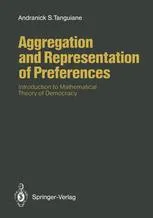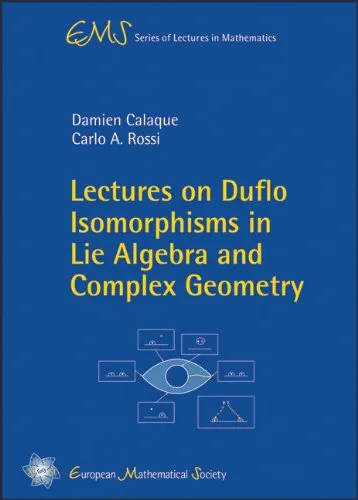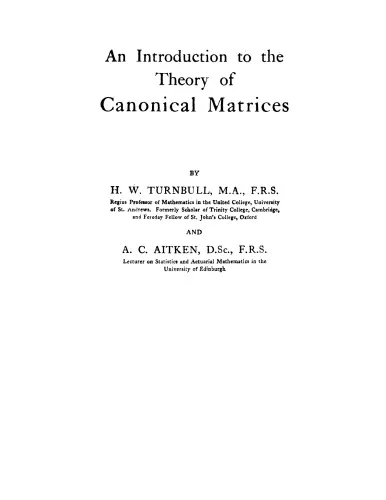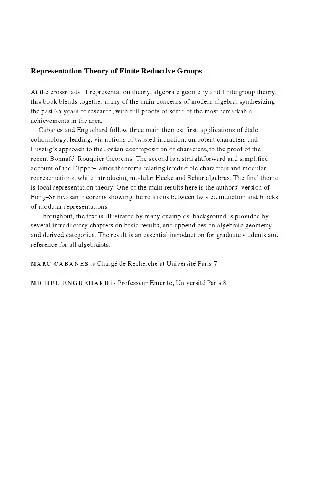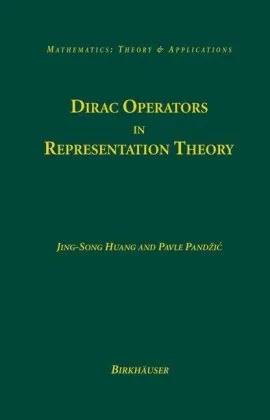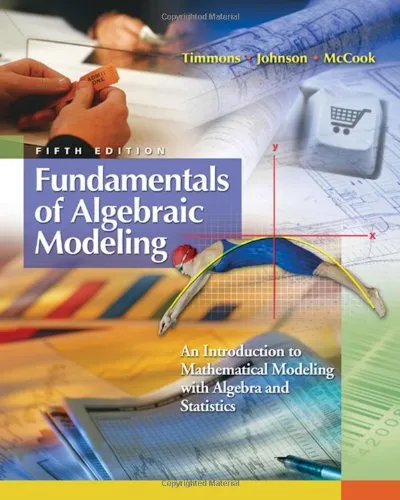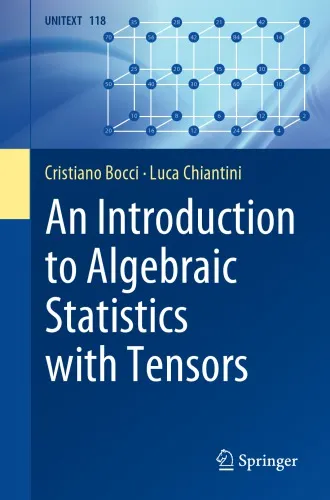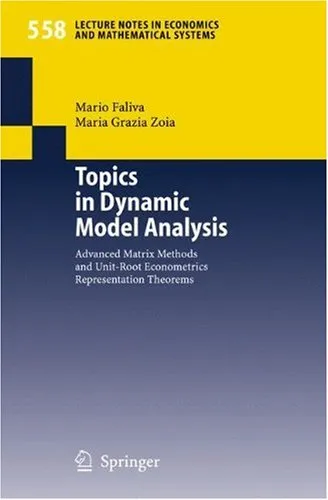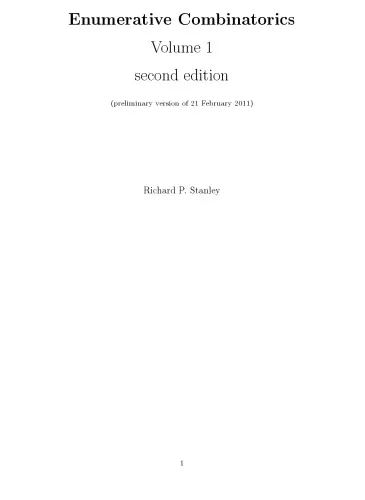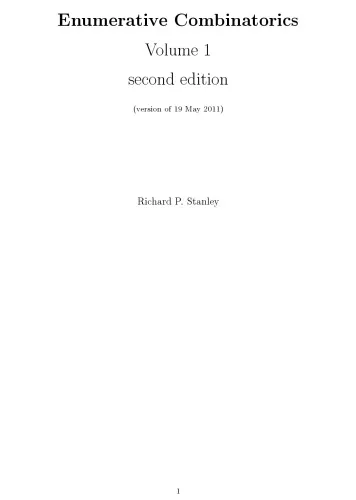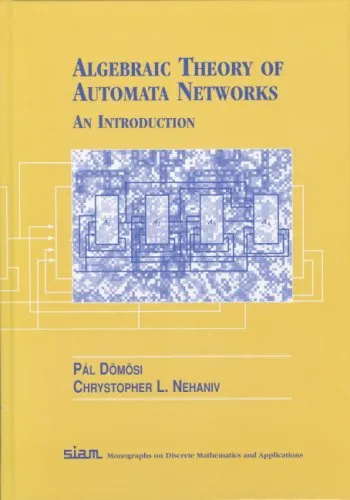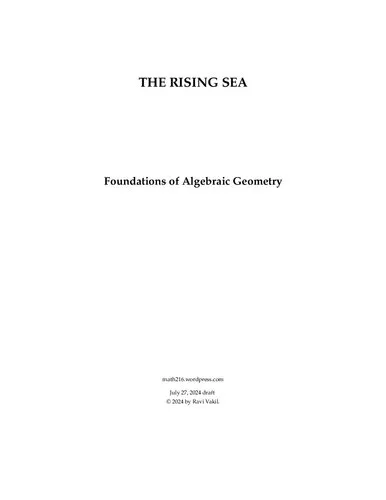Aggregation and Representation of Preferences: Introduction to Mathematical Theory of Democracy
4.4
بر اساس نظر کاربران

شما میتونید سوالاتتون در باره کتاب رو از هوش مصنوعیش بعد از ورود بپرسید
هر دانلود یا پرسش از هوش مصنوعی 2 امتیاز لازم دارد، برای بدست آوردن امتیاز رایگان، به صفحه ی راهنمای امتیازات سر بزنید و یک سری کار ارزشمند انجام بدینکتاب های مرتبط:
معرفی کتاب
کتاب "Aggregation and Representation of Preferences: Introduction to Mathematical Theory of Democracy" به قلم دکتر اندرانیک اس. تانگیان، اثری جامع در زمینه نظریه ریاضی دموکراسی و نحوه تجمیع و نمایندگی خواستهها و ترجیحات اجتماعی است. این کتاب با رویکردی علمی و تحلیلی به بررسی چگونگی تبدیل ترجیحات فردی به تصمیمگیریهای جمعی میپردازد و مسائل مرتبط با نظریه انتخاب اجتماعی را بررسی میکند.
خلاصهای از کتاب
هدف اصلی این کتاب، ارائهی یک فریمورک ریاضیمحور برای درک و تحلیل فرآیندهای انتخاب جمعی است. در ابتدا، نویسنده به مطالعهی مفاهیم پایهای چون Aggregation، ترجیحات فردی و نحوهی ترکیب آنها در یک سیستم دموکراتیک میپردازد. در بخشهای بعدی، کتاب به روشهای مختلف Aggregation پرداخته و به کاستیها و پیچیدگیهای آن اشاره میکند.
در ادامه، نویسنده به بررسی مشکلات و پارادوکسهای مشهور در نظریه انتخاب اجتماعی، همچون پارادوکس Condorcet و قضیه عدم امکان Arrow میپردازد و راهحلهای مختلف برای این معضلات را تحلیل میکند. در بخش نهایی، کتاب به راهکارهایی برای ایجاد سیستمی عادلانهتر و پایدارتر در تصمیمگیریهای جمعی اشاره دارد.
یادگیریهای کلیدی
- درک عمیقتر از نظریههای Aggregation و انتخاب اجتماعی.
- شناسایی و تحلیل پارادوکسها و مشکلات ذاتی در تصمیمگیریهای جمعی.
- ارائه راهحلهایی مبتنی بر ریاضیات برای ایجاد سیستمهای دموکراتیک مؤثرتر.
نقلقولهای معروف از کتاب
'در نظامهای دموکراتیک، تعامل بین ترجیحات فردی و تصمیمات جمعی همواره موضوعی چالشبرانگیز و بنیادین است.'
'فرآیند Aggregation چیزی بیش از جمعآوری نظرهای فردی است؛ بلکه نیازمند تحلیل، شفافیت و درک عمیق از ساز و کارهای اجتماعی میباشد.'
چرا این کتاب اهمیت دارد
این کتاب، از جهت ارائه دیدگاهی جامع و دقیق به نظریه ریاضی دموکراسی و نورپردازی به زوایای ناشناختهای از فرآیندهای انتخاب اجتماعی، نقشی برجسته در زمینه مطالعات سیاسی و اجتماعی ایفا میکند. از آنجا که بسیاری از مسائل و چالشهای دموکراتیک امروزی مستقیم با موضوعات این کتاب درگیر هستند، مطالعه آن میتواند به بهبود و ارتقاء سیستمهای دموکراتیک کمک شایانی نماید.
Welcome to the intricate, fascinating world of social choice and democratic theory. "Aggregation and Representation of Preferences: Introduction to Mathematical Theory of Democracy" delves into the mathematical underpinnings of collective decision-making processes. This book is designed to bridge the gap between theoretical frameworks and practical applications in understanding democratic principles and mechanisms.
Summary of the Book
At its core, the book explores the mathematical models that underpin collective decision-making processes. These models aim to understand how individual preferences can be aggregated to produce outcomes representative of the collective will. This exploration is deeply rooted in the theory of social choice, a field that has its origins in the foundational works of Kenneth Arrow and others. The book discusses various voting systems, highlighting their potential advantages and pitfalls, and provides a mathematical framework to evaluate their effectiveness.
The initial chapters lay the groundwork, introducing key concepts such as preference aggregation, social welfare functions, and the Arrow's impossibility theorem. Subsequent sections provide a thorough examination of voting rules and their properties, including anonymity, neutrality, and monotonicity. The book also covers real-world applications, demonstrating how these theoretical concepts play out in actual democratic systems.
A significant portion of the text is dedicated to discussing the relevance and implications of social choice theory in contemporary democracies. It also engages with emerging challenges in democratic theory, proposing innovative mathematical solutions to contemporary problems. Engaging with this material allows one to appreciate the complexity of designing fair and effective democratic institutions.
Key Takeaways
- Develop a deep understanding of the mathematical theories underlying social choice and democracy.
- Gain insights into how individual preferences are aggregated in democratic systems.
- Explore the strengths and limitations of various voting mechanisms.
- Understand the practical implications of theoretical findings in real-world democratic systems.
Famous Quotes from the Book
"Democracy is not merely the summation of votes; it is an intricate interplay of preferences where mathematics becomes poetry."
"In a world full of voices, the math of aggregation seeks harmony in discord."
Why This Book Matters
In an era where the strength and integrity of democratic systems are constantly tested, understanding the underlying mechanics that govern these processes is crucial. This book equips readers with the knowledge to critically evaluate and contribute to discussions on democratic reforms and election systems. By presenting a rigorous mathematical approach to the study of democracy, it appeals to scholars and practitioners alike who strive for a deeper comprehension of how we can harness collective intelligence for the greater good.
The societal relevance of understanding preference aggregation cannot be overstated. As political landscapes grow increasingly complex and interconnected, the demand for systems that accurately reflect the collective will becomes paramount. This book provides the tools to not only understand these systems but also to contribute to their evolution. It's more than just a book about democracy—it's a call to engage with the democratic process systematically and thoughtfully, ushering in an era where decisions made by the many are informed, fair, and representative.
دانلود رایگان مستقیم
شما میتونید سوالاتتون در باره کتاب رو از هوش مصنوعیش بعد از ورود بپرسید
دسترسی به کتابها از طریق پلتفرمهای قانونی و کتابخانههای عمومی نه تنها از حقوق نویسندگان و ناشران حمایت میکند، بلکه به پایداری فرهنگ کتابخوانی نیز کمک میرساند. پیش از دانلود، لحظهای به بررسی این گزینهها فکر کنید.
این کتاب رو در پلتفرم های دیگه ببینید
WorldCat به شما کمک میکنه تا کتاب ها رو در کتابخانه های سراسر دنیا پیدا کنید
امتیازها، نظرات تخصصی و صحبت ها درباره کتاب را در Goodreads ببینید
کتابهای کمیاب یا دست دوم را در AbeBooks پیدا کنید و بخرید
1389
بازدید4.4
امتیاز0
نظر98%
رضایتنظرات:
4.4
بر اساس 0 نظر کاربران
Questions & Answers
Ask questions about this book or help others by answering
No questions yet. Be the first to ask!
